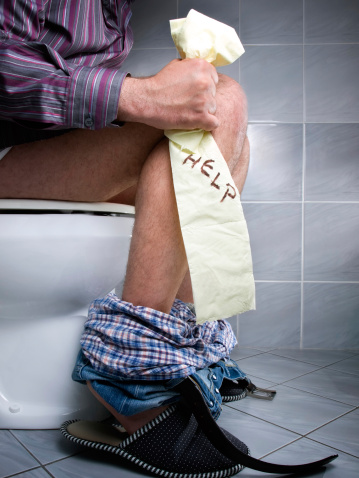
So What are Hemorrhoids Exactly?
Hemorrhoids are swollen and inflamed veins in your anus and lower rectum. Hemorrhoids can be internal (on the inside) or external (on the outside). They can result from straining during a bowel movement, sitting on the toilet for extended periods of time, having chronic diarrhea or constipation, and/or engaging in anal intercourse. All of these activities affect blood flow to and from the area and cause it to pool and enlarge the vessels resulting in hemorrhoids. Hemorrhoids can also occur during pregnancy when there is increased pressure on the veins in this area. Symptoms of hemorrhoids, according to the Mayo Clinic include: painless bleeding during a bowel movement, itching around your anus, pain or discomfort, swelling around the anus, a lump or bump near your anus that is sensitive to the touch, and/or leakage of feces.
The Home Remedy You Need to Know for Hemorrhoids
The good news is that trying home therapies to treat your hemorrhoids won’t cause you any embarrassment and in most cases will help to resolve your symptoms. Try the following tips to ease hemorrhoid symptoms:
- Eat more fiber – fiber helps to soften stools and makes them easier to pass. This puts less pressure on your hemorrhoids.
- Drink lots of water – just like fiber, plenty of fluid will help to soften your stools putting less pressure on your hemorrhoids.
- Soak in a warm bath – soaking in a warm tub for 10 – 15 minutes a day will help to relieve itching, irritation and spasm around the anal area that commonly occurs with hemorrhoids.
- Use topical creams – applying over-the-counter hemorrhoid creams and ointments that contain a local anesthetic, hydrocortisone and/or witch hazel will help to relieve some of the pain and irritation that you may be experiencing. However, don’t use topical ointments for more than a week without consulting your doctor.
- Ice the area – ice applied to the anal region can help to ease swelling.
- Avoid heavy lifting or straining
- Take pain killers – if needed, take over-the-counter pain relievers to help ease the pain associated with hemorrhoids.
If these home treatments don’t relieve your symptoms, it may be time to visit your doctor to get more aggressive treatment.
If They Don’t Resolve on Their Own – The Home Treatment for Hemorrhoids
While most hemorrhoids will resolve on their own within a week or two, there may be some people that need to seek additional medical care for pesky hemorrhoids that are sticking around causing unwanted discomfort. If you have an external hemorrhoid and a clot has developed, a simple procedure to excise the clot may provide immediate relief.
If you have internal hemorrhoids that are causing persistent bleeding or pain your doctor may recommend other, minimally invasive procedures including:
– Rubber band ligation – involves placing a rubber band around the base of the hemorrhoid. This band causes the hemorrhoid to shrink and fall off, usually within a week or so.
– Injection – involves injecting a chemical solution into the hemorrhoid in an effort to shrink it.
– Coagulation – this technique uses laser, infrared light or heat and causes small, bleeding internal hemorrhoids to harden and shrivel up.
If these minimally invasive techniques don’t remove your hemorrhoids there are surgical treatment options including a hemorrhoidectomy or hemorrhoid stapling which are more invasive but may be necessary in some cases. In order to determine what treatment option is best for you, speak with your doctor.
When is this Condition an Emergency?
While hemorrhoids can usually be managed with home care and lifestyle changes, there are situations where rectal bleeding could be an emergency situation. One of the most common symptoms that accompany hemorrhoids is rectal bleeding. However, rectal bleeding can also be a symptom of emergency conditions such as colorectal cancer, anal cancer or colitis. In order to rule out these more serious, emergency conditions, visit your doctor to have a physical exam.
RELATED READING: Why Suffer in Silence When You Can Conquer Your Leaky Bladder
If you have a noticeable change in bowel habits at the same time as hemorrhoids, such as black, tarry or maroon coloured stools, blood clots or blood mixed in your stool, consult your doctor immediately. These bowel changes could mean that you have further bleeding in your digestive tract and this may lead to an emergency if the bleeding isn’t found and stopped. In order to avoid an emergency, if you are concerned at all about your rectal bleeding or hemorrhoid symptoms, seek medical attention to be on the safe side.
There are a couple of things that you need to remember when it comes to hemorrhoids: most of them resolve without invasive treatment and you’re not the only one suffering from them. It’s time to get over your embarrassment about them and speak up. Chances are someone’s suffering with the same pain as you are, and they’re also afraid to bring up this touchy topic.